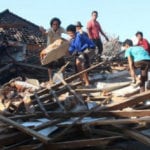 Movies and TV
Movies and TV  Movies and TV
Movies and TV  Creepy
Creepy 10 Eerie & Mysterious Ghosts of the Pacific Coast
 Weird Stuff
Weird Stuff 10 Typos That Accidentally Changed History
 History
History 10 Times Trickery Won Battles
 Technology
Technology 10 Awesome Upgrades to Common Household Items
 Misconceptions
Misconceptions 10 Hilarious (and Totally Wrong) Misconceptions About Childbirth
 Weird Stuff
Weird Stuff 10 Warning Labels That Exist Because Someone Actually Tried It
 Health
Health Ten Confounding New Inventions from the World of Biomedicine
 Creepy
Creepy 10 Death Superstitions That Will Give You the Creeps
 Movies and TV
Movies and TV 10 Movies That Get Elite Jobs Right, According to Experts
 Movies and TV
Movies and TV 10 Most Realistic Medical TV Shows of All Time
 Creepy
Creepy 10 Eerie & Mysterious Ghosts of the Pacific Coast
 Weird Stuff
Weird Stuff 10 Typos That Accidentally Changed History
Who's Behind Listverse?

Jamie Frater
Head Editor
Jamie founded Listverse due to an insatiable desire to share fascinating, obscure, and bizarre facts. He has been a guest speaker on numerous national radio and television stations and is a five time published author.
More About Us History
History 10 Times Trickery Won Battles
 Technology
Technology 10 Awesome Upgrades to Common Household Items
 Misconceptions
Misconceptions 10 Hilarious (and Totally Wrong) Misconceptions About Childbirth
 Weird Stuff
Weird Stuff 10 Warning Labels That Exist Because Someone Actually Tried It
 Health
Health Ten Confounding New Inventions from the World of Biomedicine
 Creepy
Creepy 10 Death Superstitions That Will Give You the Creeps
 Movies and TV
Movies and TV 10 Movies That Get Elite Jobs Right, According to Experts
10 Mind-Blowing Things That Happened This Week (2/2/18)
Keeping up with the news is hard. So hard, in fact, that we’ve decided to save you the hassle by rounding up the most significant, unusual, or just plain old mind-blowing stories each week.
The week leading us into February was a fairly depressing one, as these things go. There was violence, the potential for violence, partisan rancor, and depressing spats that involved the trampling of free speech. It wasn’t all doom and gloom, but both were certainly in high supply. Fingers crossed that next week’s news helps chase away the winter blues.
10 South Korea Suffered Its Deadliest Fire In A Decade
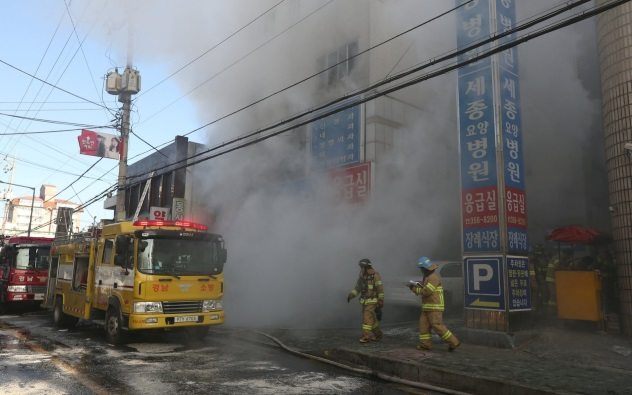
Just before Christmas 2017, a fire ripped through a sports center in Jecheon, South Korea, killing nearly 30 people. At the time, the blaze was the country’s deadliest in a decade. Sadly, it didn’t hold that record for very long.
Last Friday, after this column had gone to press, another massive fire hit South Korea, this time consuming a hospital in Miryang. 37 people died as patients scrambled to escape the inferno, with another 130 injured. The fire now holds the title of South Korea’s deadliest fire since the Icheon factory blaze in 2008 killed 40.[1]
That it didn’t surpass the Icheon fire is something of a minor miracle. Initial reports suggested 41 patients had succumbed, only for the figure to later be revised down. Still, the latest blaze was a horrific tragedy, not least for how preventable it was. After the disaster, the hospital director admitted there had been no sprinkler system in the devastated building. Incredibly, such basic fire prevention measures have only been compulsory since last June.
9 A Gigantic Suicide Bomb Devastated The Afghan Capital
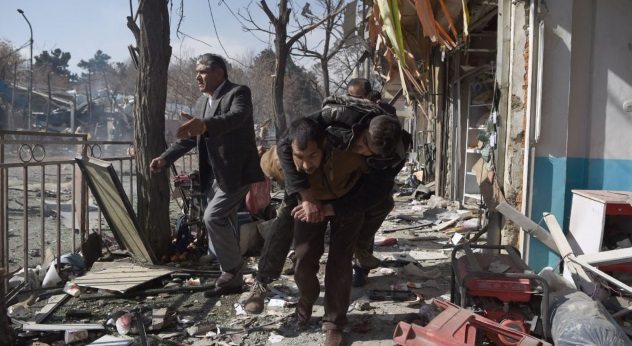
Just last week, we informed you about twin terrorist attacks in Afghanistan that had claimed 45 lives. Sadly, it turned out these tragedies were just warm-ups for the main act. On Saturday, the Taliban detonated an enormous car bomb outside the Ministry of the Interior in Kabul, at a time when the area was crawling with civilians. 103 lives were snuffed out in an instant.[2] 235 were injured. The death toll may yet climb.
The bombing was particularly shocking for the callous way in which it was carried out. The device was hidden inside an ambulance which was waved through police cordons before detonating in the middle of a crowd of people. It follows on from a May 2017 truck bomb that killed 150 in the war-torn capital and caused outrage across the globe.
The attack also underscores just how potent a threat the Taliban remain, over 16 years after US forces ousted them from power. A BBC analysis this week found the terrorist group is active in over 70 percent of the country. Never before has Afghanistan’s designation as “the unwinnable war” seemed so apt.
8 Czech Republic’s Controversial President Won A Second Term

On Saturday, Czech president Milos Zeman was narrowly reelected following a campaign tarred with anti-immigrant statements and accusations of help from Moscow. If you think that sounds familiar, you’re not alone. Sites from The Washington Post to The Guardian to Breitbart were quick to pour over the implications of the “Czech Trump’s” win.
The reality was a little more nuanced. While Zeman certainly has some characteristics in common with the US president, he also has his differences.[3] Zeman has been a political player since the fall of Communism. He was prime minister from 1998 to 2002, an office that has far more power than the presidency. His anti-immigrant pronouncements are also fairly mainstream for Czech society, and his “right wing” persona is belied by his 2009 co-founding of the center-left (and anti-Islam) SPO party. There’s also a certain irony in pro-Trump US media lauding “the Czech Trump” when President Trump himself has repeatedly snubbed him.
That’s not to say the election wasn’t divisive. Many Czechs were concerned about the frail Zeman’s ability to survive a second term as well as his worrying closeness with newly elected PM Andrej Babis, currently under investigation for fraud.
7 Colombia’s Peace Process Was Shattered By Anti-Police Bombings
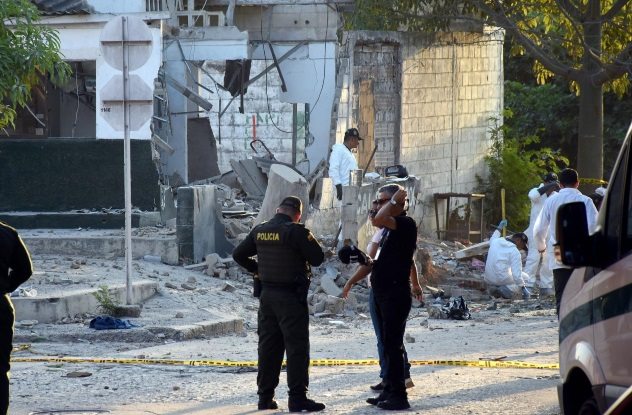
Since FARC disbanded in 2017, the biggest name in Colombian terrorism has been ELN. A left-wing group that has been running an insurgency against the state since 1964, ELN has been engaged in a peace process with the government of President Santos since March 2016.
After a cease-fire expired in early January, ELN announced their return to fighting with bomb attacks on oil pipelines. Last weekend, though, they went even further. On Saturday, a wave of bombings hit police stations across the country, killing seven officers and injuring nearly 50. When ELN claimed the attacks, the government was forced to suspend the peace process.
The worst attack was in Barranquilla, where a bomb smuggled into a police station exploded during morning briefing, killing five officers and leaving 40 horrifically wounded.[4] Savage as they were, the attacks were also incomprehensible. ELN has under 2,000 members, far less than FARC had when they laid down their arms. They were also deep into peace talks with the government and looking forward to a negotiated settlement. Instead, it seems Colombia’s endless war is doomed to drag on.
6 Twitter Discovered Millions Of Its Users Were Bots For Hire

In today’s social media–dominated world, influence is king. The number of retweets and followers you have can do anything from net you a book deal to help spread your poisonous views to the world.
It has long been known that many accounts on Twitter were bots, or followers for hire. But it wasn’t until a New York Times report dropped this week that we realized just how prevalent the problem was. Their investigation into bot factory Devumi revealed over 50 pundits and celebrities who’d paid to have their tweets amplified. They ranged from people like The Great British Bake Off presenter Paul Hollywood to CNN’s Hilary Rosen to Breitbart’s Aaron Klein to the actual president of Ecuador.[5] Amusingly, one of the Times’s own columnists was caught up in the scandal.
There were two particularly worrying aspects about this. The first was about those with controversial opinions using fake followers to make their ravings appear more legit, thus spreading their views. The other was that Devumi may have stolen images and identities from real Twitter profiles—including those belonging to minors. The company denies wrongdoing.
5 Brazil Seized Its Ex-President’s Passport

At this stage, it’s effectively impossible to summarize Brazil’s sprawling Odebrecht Scandal in under 200 words, so we’re not even going to try. Just rest assured it’s probably the biggest corruption scandal in history and has been felling major political and business figures across Latin America like daisies before a tornado.
Former Brazilian president Lula was caught up in a related investigation not so long ago and was handed a nine-year sentence that was increased to 12 in January on appeal. Last Friday, his case took a turn for the worse. Brazilian judges ordered the disgraced politician’s passport be seized so that he couldn’t flee the country. It now looks like this once-popular president’s career is going to end in some serious jail time.[6]
To call this a massive shake-up for Brazilian politics would be to underplay the shock waves it has sent out. Lula is the Worker’s Party’s candidate for the October presidential election and was considered the clear front-runner. If he’s barred from running, the race blows wide open. If he manages to stay in the race regardless, Brazil may wind up being ruled by a man inside a cell.
4 Poland And Israel Went To War Over Their Shared History

The 1939 German invasion of Poland was one of the worst atrocities in a global conflict defined by how utterly atrocious it was. 20 percent of the population died, with the destruction of Warsaw alone killing around 200,000. Three million Jews liquidated in the Holocaust were Polish. By any reasonable metric, most Poles were victims in World War II.
However, not every single Polish person was innocent. The Simon Wiesenthal Center estimates several thousand Poles shopped their Jewish neighbors to the Gestapo or otherwise collaborated, which is where this week’s feud between Poland and Israel sprang from. On Thursday, Poland’s senate passed a bill criminalizing any mentioning of Polish collaboration in the Holocaust. Those who break the new law will face up to three years in prison.[7]
The reaction created a rare show of unity in Israel’s Knesset. Government and opposition figures alike took turns to denounce Poland’s whitewashing of its citizens’ history. In response, Tel Aviv is now pushing through a bill that would criminalize anyone denying the role of Poles or other collaborators in the Holocaust. Those who break this law would face five years in jail. There are worries that both bills could stifle free speech.
3 A Diesel Testing Scandal Shocked Germany

The biggest story in Germany this week hasn’t been about the ongoing negotiations to form a government. It’s been about a scandal involving the testing of noxious diesel fumes. Last Wednesday, the story broke that carmakers had been testing the effects of inhaling diesel on monkeys. This weekend, it was revealed that they’d conducted those same tests on human beings. The German media went nuts.[8]
The tests took place sometime between 2012 and 2015, with human volunteers being exposed to varying levels of toxic diesel fumes for a number of hours. The testing violated ethical standards and caused outrage across German society. By midweek, the carmakers themselves—including Volkswagen, BMW, and Daimler—were distancing themselves from the tests. For an industry still reeling from an emissions-fixing scandal, it was an unwanted blow.
Interestingly, such tests aren’t that unusual and are often performed across the world. Already, some in Germany are starting to wonder if the reaction was overblown.
2 Kenya Unexpectedly Got A Second President
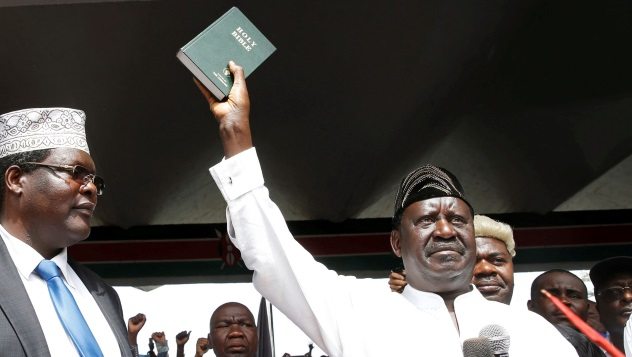
On January 30, Raila Odinga was sworn in as Kenya’s president in a ceremony in Nairobi attended by thousands. There was just one problem. Kenya already had a president. Uhuru Kenyatta was sworn in after winning October’s election with 98 percent of the vote, having run unopposed. With two men now claiming to be the rightful president, Kenya is hurtling toward a constitutional crisis.[9]
The dual presidency is just the latest twist in an election story that’s been rumbling on since the country first went to the polls in August. In defiance of predictions, Odinga lost narrowly to Kenyatta, triggering unrest. Odinga challenged the result, and the Supreme Court annulled the election and set a date for a rerun in October. But Odinga abruptly pulled out, saying the government was trying to rig the election for Kenyatta. With the opposition party claiming to have evidence that they won the August elections, Odinga decided to be sworn in as a “people’s president.” He now claims to be the legitimate ruler of Kenya.
Both Odinga and Kenyatta are playing with fire. Elections routinely lead to mass violence in Kenya, with nearly 100 dying last year alone.
1 Washington Mistrust Hit Dangerous New Lows
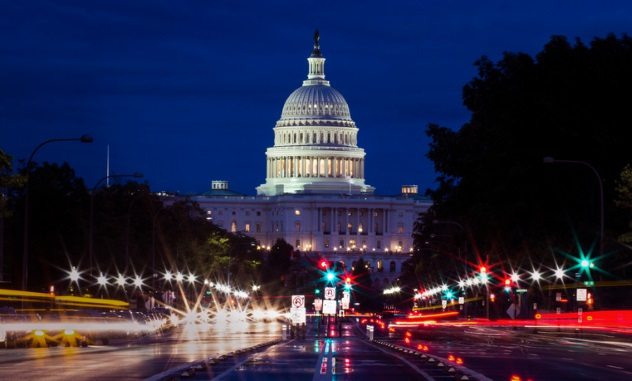
This is starting to get ugly now.
US politics has been crazily divided for years. Since the election of President Trump, those divisions have gotten worse. There are currently two competing investigations into the FBI and the president, both seen as a distraction from the other, depending on who you ask.
This week, this partisan rancor hit new lows. Republicans on the House Intelligence Committee voted to release a memo they say proves the FBI engaged in illegal spying on the Trump campaign. House Democrats grumblingly voted it through, only to turn around and say the memo had been altered after the vote to give a one-sided picture. Both Democrats and Republicans now accuse the other of orchestrating a smokescreen.[10]
The issue isn’t who’s right and who’s wrong. It’s that this story even exists in the first place. There is no safe and sane universe where either party should be accusing the other of compromising national security for political gain. That they are suggests both the left and right no longer see each other as rivals but as enemies who need to be thwarted at all costs.
This is dangerous. When society is divided, and the media is feeding those divisions, it is up to those in charge to lead by example. By playing contemptible games and encouraging supporters to think in terms of Us and Them, they increase the chances of violence. Maybe not today, maybe not next year, but somewhere down the line.
Encouraging people to hate and fear one another, whether because of race or political preference or anything else, can only ever end badly. Let’s all pray those in Washington start acting like adults again before some unhinged ultra-partisan supporter takes things too far.
Missed the news lately? Catch up on more mind-blowing events from January 26, 2018 and January 19, 2018.






